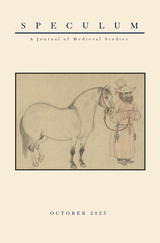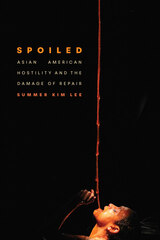
“[This] is certainly a masterpiece.”—Thomas S. Ulen, Journal of Economic Literature
“The strength of Shavell’s book is its lucid, structured development and explication of the economic model. It represents the best systematic presentation of the relevance of economic argument for issues of risk allocation.”—Jules L. Coleman, Yale Law Journal
“Steven Shavell…[has] drawn upon [his] previous path-breaking work to issue [one of] the most important books in the law and economics of tort law since the release in 1970 of Guido Calabresi’s The Costs of Accidents…The work is a masterful tribute to the power of economic modelling and the use of optimization techniques…I, for one, was immensely impressed by the richness of the insights that Shavell’s theoretical approach provided into the fundamental issues of tort law.”—John J. Donohue III, Harvard Law Review
Accident law, if properly designed, is capable of reducing the incidence of mishaps by making people act more cautiously. Scholarly writing on this branch of law traditionally has been concerned with examining the law for consistency with felt notions of right and duty. Since the 1960s, however, a group of legal scholars and economists have focused on identifying the effects of accident law on people’s behavior. Steven Shavell’s book is the definitive synthesis of research to date in this new field.
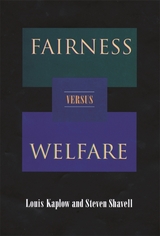
By what criteria should public policy be evaluated? Fairness and justice? Or the welfare of individuals? Debate over this fundamental question has spanned the ages.
Fairness versus Welfare poses a bold challenge to contemporary moral philosophy by showing that most moral principles conflict more sharply with welfare than is generally recognized. In particular, the authors demonstrate that all principles that are not based exclusively on welfare will sometimes favor policies under which literally everyone would be worse off. The book draws on the work of moral philosophers, economists, evolutionary and cognitive psychologists, and legal academics to scrutinize a number of particular subjects that have engaged legal scholars and moral philosophers.
How can the deeply problematic nature of all nonwelfarist principles be reconciled with our moral instincts and intuitions that support them? The authors offer a fascinating explanation of the origins of our moral instincts and intuitions, developing ideas originally advanced by Hume and Sidgwick and more recently explored by psychologists and evolutionary theorists. Their analysis indicates that most moral principles that seem appealing, upon examination, have a functional explanation, one that does not justify their being accorded independent weight in the assessment of public policy.
Fairness versus Welfare has profound implications for the theory and practice of policy analysis and has already generated considerable debate in academia.
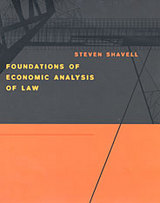
What effects do laws have? Do individuals drive more cautiously, clear ice from sidewalks more diligently, and commit fewer crimes because of the threat of legal sanctions? Do corporations pollute less, market safer products, and obey contracts to avoid suit? And given the effects of laws, which are socially best? Such questions about the influence and desirability of laws have been investigated by legal scholars and economists in a new, rigorous, and systematic manner since the 1970s. Their approach, which is called economic, is widely considered to be intellectually compelling and to have revolutionized thinking about the law.
In this book Steven Shavell provides an in-depth analysis and synthesis of the economic approach to the building blocks of our legal system, namely, property law, tort law, contract law, and criminal law. He also examines the litigation process as well as welfare economics and morality. Aimed at a broad audience, this book requires neither a legal background nor technical economics or mathematics to understand it. Because of its breadth, analytical clarity, and general accessibility, it is likely to serve as a definitive work in the economic analysis of law.
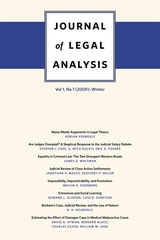
Co-published by the John M. Olin Center for Law, Economics, and Business at Harvard Law School and Harvard University Press, the JLA is a faculty-refereed, peer-reviewed publication on law. It aspires to be broad in coverage, including doctrinal legal analysis and interdisciplinary scholarship. JLA articles are free online and available for sale in bound issues.
Volume 1, Issue 1 contains contributions from Adrian Vermeule (Many-Minds Arguments in Legal Theory), Stephen J. Choi, G. Mitu Gulati, and Eric A. Posner (Are Judges Overpaid? A Skeptical Response to the Judicial Salary Debate), James Q. Whitman (Equality in Criminal Law: The Two Divergent Western Roads), Jonathan R. Macey and Geoffrey P. Miller (Judicial Review of Class Action Settlements), Melvin A. Eisenberg (Impossibility, Impracticability, and Frustration), Edward L. Glaeser, Cass R. Sunstein (Extremism and Social Learning), R. H. Helmholz (Bonham's Case, Judicial Review, and the Law of Nature), and David A. Hyman, Bernard Black, Charles Silver, and William M. Sage (Estimating the Effect of Damages Caps in Medical Malpractice Cases).
http://jla.hup.harvard.edu
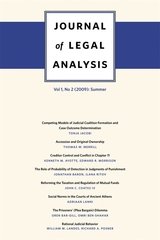
Co-published by the John M. Olin Center for Law, Economics, and Business at Harvard Law School and Harvard University Press, the JLA is a faculty-refereed, peer-reviewed publication on law. It aspires to be broad in coverage, including doctrinal legal analysis and interdisciplinary scholarship. JLA articles are free online and available for sale in bound issues.
Volume 1, Issue 2 contains contributions from Tonja Jacobi (Competing Models of Judicial Coalition Formation and Case Outcome Determination), Thomas W. Merrill (Accession and Original Ownership), Kenneth M. Ayotte and Edward R. Morrison,(Creditor Control and Conflict in Chapter 11), Jonathan Baron and Ilana Ritov (The Role of Probability of Detection in Judgments of Punishment), John C. Coates (Reforming the Taxation and Regulation of Mutual Funds: A Comparative Legal and Economic Analysis), Adriaan Lanni (Social Norms in the Courts of Ancient Athens), Oren Bar-Gill and Omri Ben-Shahar (The Prisoners' (Plea Bargain) Dilemma), and William M. Landes and Richard A. Posner (Rational Judicial Behavior: A Statistical Study).
http://jla.hup.harvard.edu
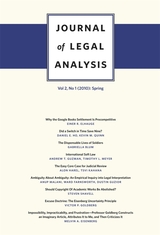
Co-published by the John M. Olin Center for Law, Economics, and Business at Harvard Law School and Harvard University Press, the JLA is a peer-reviewed publication on law. It aspires to be broad in coverage, including doctrinal legal analysis and interdisciplinary scholarship. JLA articles are free online and available for sale in bound issues.
Volume 2, Issue 1 contains contributions from Einer R. Elhauge, Daniel E. Ho, Kevin M. Quinn, Gabriella Blum, Andrew T. Guzman, Timothy L. Meyer, Alon Harel, Tsvi Kahana, Anup Malani, Ward Fransworth, Dustin Guzior, Steven Shavell, Victor P. Goldberg, and Melvin A. Eisenberg.
http://jla.hup.harvard.edu
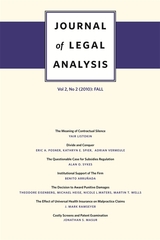
Co-published by the John M. Olin Center for Law, Economics, and Business at Harvard Law School and Harvard University Press, the JLA is a peer-reviewed publication on law. It aspires to be broad in coverage, including doctrinal legal analysis and interdisciplinary scholarship. JLA articles are free online and available for sale in bound issues.
Volume 2, Issue 2 contains contributions from Yair Listokin, Eric Posner, Kathryn Spier, Adrian Vermeule, Alan Sykes, Benito Arruñada, Theodore Eisenberg, Michael Heise, Ncole Waters & Martin Wells, J. Mark Ramseyer, and Jonathan Masur.
http://jla.hup.harvard.edu
READERS
Browse our collection.
PUBLISHERS
See BiblioVault's publisher services.
STUDENT SERVICES
Files for college accessibility offices.
UChicago Accessibility Resources
home | accessibility | search | about | contact us
BiblioVault ® 2001 - 2025
The University of Chicago Press



